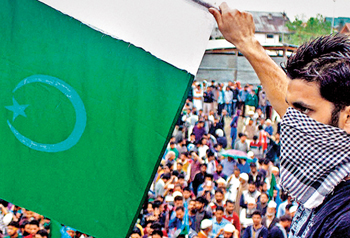Srinagar, Apr 16: After a gap of five years, Jammu and Kashmir Government today allowed hardline separatist leader Syed Ali Shah Geelani to hold a public rally in the outskirts of Srinagar city where his supporters including Masarat Alam, released from jail last month, raised pro-Pakistan slogans and others waved Pakistani flags.
 Geelani, who returned here after spending winter months in Delhi, was taken to his residence from the airport in a procession led by Alam against whom state Police registered a case under Unlawful Activities Prevention Act.
Geelani, who returned here after spending winter months in Delhi, was taken to his residence from the airport in a procession led by Alam against whom state Police registered a case under Unlawful Activities Prevention Act.
He is likely to be arrested, official sources said.
BJP, alliance partner of PDP in Jammu and Kashmir, reacted sharply to this with Minister of State for Home Kiran Rijiju saying that the state government had been asked to act against those who had broken the law.
Taking a swipe at BJP, Congress if it was so concerned with the development, it should walk out of the alliance.
Alam, who was released last month soon after PDP-BJP government came to power in the state, led the march from the Srinagar Airport to Geelani's residence at Hyderpora.
Geelani, who broke away from Hurriyat Conference to form his own conglomerate with all pro-Pakistan separatist parties as a part of it, spoke about right of self-determination and his speech was broadcast live in Muzzafarabad in Pakistan- occupied-Kashmir (PoK).
"This (broadcast of Geelani's speech) has been done with arrangement with a semi-government organisation in PoK," Hurriyat Conference spokesman Ayaz Akbar said.
There were some anxious moments when slogans were raised in support of 45-year-old Alam besides pro-Pakistan and Geelani slogans. He is being talked about being successor to Geelani.
Talking to reporters, Alam rejected the suggestions that he was indulging in unlawful activities.
"We are only promoting the aspirations of the people of Kashmir. Look at their enthusiasm," he said apparently referring to the group of youth waving Pakistani flags.
This was Geelani's first public rally after the 2010 summer agitation in Srinagar in which over 100 youths were killed. Alam was a key player in the entire agitation and used to issue a weekly schedule for strikes.
Besides the Hurriyat flags, some supporters were also seen carrying Pakistani flags as they chanted pro-Pakistan and pro-freedom slogans.
Addressing the gathering, Geelani said Kashmir was not a border dispute between India and Pakistan but the issue of one crore people of the state.
"We will not accept status quo and our struggle to achieve right to self-determination will continue. We will not accept Shimla agreement or Lahore declaration," Geelani said.





Comments
Add new comment